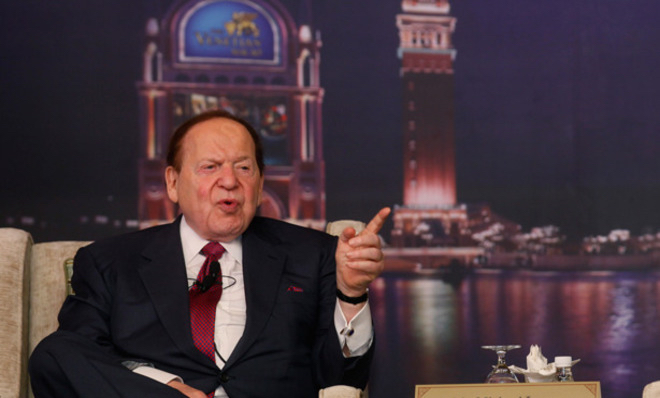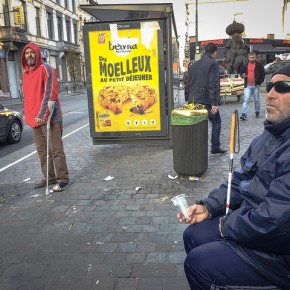Liberalism has always retained its own authoritarian option, the right to defend itself, if necessary with violence, both against outside enemies and the enemy within. It has also always been tinged with fear of instability and paranoia. As soon as the strict boundaries protecting the “sphere of property” from government intrusion are understood to have been transgressed, property owners have become victims of oppression.
Elites have the right to resist this transgression with violence. Their privileges are portrayed as their natural right, and as identical with their freedom. Any threat to those privileges are a form of oppression, and must be resisted.
Today, the real elites feel safe and secure, and have no need to resort to violence. But in the era of permanent neoliberal recession, these ideas have traveled down the social ladder, and circulate among the individualistic and hopeless atmosphere that has also brought to the fore apocalyptic trends like survivalism and the nihilism of radical libertarianism. They have combined, with an almost Jacobin anti-elitist rage, only with a reactionary twist.
Nationalists today distrust the elites, but only because they feel betrayed by them, because they see them as agents of a “globalist” progressive agenda that favors the rights of minorities, immigrants, welfare recipients, and big business over those of “ordinary people.” What they are calling for – those that do not completely succumb to apathetic cynicism, that is – is a new, more ruthless leadership that will be once again loyal to them. As Donald Trump said in one of his speeches: “I will make America so great again, you will be so proud again to be an American.”
For members of the declassé white middle class, which is becoming increasingly marginalized in the post-industrial economy, the idea that they have to aggressively and violently assert themselves against their oppressors makes a scary kind of sense. Unlike, say, African-Americans, who possess a political tradition that helps them to respond to their marginalization in a progressive way, in the near-absence of any leftist populism on the national scene, white Americans know little else than to mimick the toxic politics of defensive elites.
Spurned on by racial paranoia and the right-wing media machine, many Americans have become convinced that the only way to defend themselves against the threat of downward mobility lies in opposing the increasingly treasonous government.
In Europe, populists are presenting themselves not only as defensive bulwarks against cultural change and immigration, but also as resistance movements against the elite-driven impositions of European integration and globalization. They are not aiming to transform their societies, but to defend them.
Obviously, the left has its own critique of the state of democracy in the European Union, and there are ample reasons to feel alienated from our system of government. But the conservative critique of democracy is different: it relies on a logic of usurpation of the seat of power by illegitimate social forces.
As I have been observing the growing anti-immigrant movement in Germany over the last months, I was struck by this self-identification as a “resistance movement.” “Widerstand! Widerstand!” / Resistance! Resistance!” is one of the slogans that is being chanted at marches all over the country. Two other favourites, “Lügenpresse / liars’ press,” and “Volksverräter / traitors of the people” equally resonate with their self-image as a brave opposition (and echo the language of Nazi-propaganda.)

The contemporary German right not only claims that Merkel has sold out “ordinary Germans.” It argues that her policies, first during the Euro crisis, now with regards to refugees, are illegal and unconstitutional, and that therefore her government has lost its legitimacy. The hazier, more conspiratorially-minded version of this argument posits that she is an American puppet, or that Merkel and her cronies’ true loyalty has always lain with shady international elites – but not with her people. Hence, she is a “traitor.”
In order to empower “ordinary citizens”, the more moderate populists all over Europe are therefore enamored with the Swiss model – an extreme renationalization of government (“national sovereignty”) combined with direct democracy. But their more extreme allies see no such easy way out, and call for more radical ways of resisting the “usurpers.”
As John Locke once argued, any illegitimate restructuring of the system of government may be resisted, if necessary with violence. In such a state of emergency, resistance and civil disobedience become legal imperatives – in fact, the German constitution grants anybody “the right to resist any person seeking to abolish [the] constitutional order, if no other remedy is available.” This passage is being frivolously, but with great effect, evoked by right-wingers today.
The parallels with American rightists are obvious. It is unsettling to see how much of the German right’s beliefs have been prefigured by American insurgent conservatism of recent years. The belief, for example, that Obama is illegitimate, and that his rule amounts to tyranny, has become virulent during his presidency. In a farcical replay of the anti-Communist scares of the Cold War, it has become common to denounce Obama as nothing less than a traitor to the nation and his power as a threat to the freedoms of every American. To be governed by him is to be oppressed.
Depending on who your sources were, from Dinesh D’Souza to Glenn Beck or Alex Jones, Obama’s real allegiance is seen as lying either with a project of belated anti-imperialist revenge, the New World Order, or – the most popular choice – Nazi-Communism. In any case, the argument went, he was hiding his true (globalist) intentions, and he had no loyalty to “real Americans.”
The clearest formulation of this obsession with Obama’s illegitimacy was represented by the racist “Birther” movement, which stubbornly questioned Obama’s legal right to even stand for election as president. Donald Trump, King of the Birthers, is now the frontrunner in the Republican primary race.

Of course, this sort of right-wing paranoia is nothing new. You can trace a long line of defensive and hateful white men throughout American history, from the militias of the 1990s – spurned on by NRA propaganda and talk radio – to at least the post-Civil War South, where the plantation class, finding their privileges under threat, may well have founded the American tradition of finding strength in fantasies of oppression.
Fantasies of oppression are an old ploy of aristocratic politics. Instead of openly admitting that what they object to is the democratization of society itself, elites have always relied on defensive fantasies of victimization to rally their forces. Anti-Communist hysteria (as for example the Hayekian belief that even the welfare state carries the seeds of tyranny) is only a variation on an almost universal theme of reactionary rhetoric.
As Corey Robin points out in The Reactionary Mind, Marie Antoinette, whose death Edmund Burke so tearfully describes in his meditations on the French Revolution, may have been one of the first props in these theatrics of victimization, but in recent decades paranoid fears have been utilized ever more effectively to mobilize the conservative base.
As it has become ever harder to make an explicit argument for social hierarchy, victimhood has become democratized. Everyone’s a victim of oppression now: Christians, gun-owners, men, the police – even the rich. And what fascinates millions of Americans about Donald Trump is his refusal to be “victimized.” He is a bully, but one who helps his self-pitying audience to stand up against those they perceive as their “oppressors” – the liberal elites and the media.
Following a playbook first invented by Richard Nixon, these politics of victimhood have for decades served as the glue keeping the disparate conservative coalition together. The American right’s obsession with the “tyranny of political correctness” in particular creates a shared, truly democratic sense of victimhood.
The point is to merge the concerns of ordinary, resentful Americans with those of the economic elites in a united front of resistance against liberal hegemony.
Photographs and courtesy of East Coast Gambler, Opposition 24.de and Benjamin. Published under a Creative Commons license.





